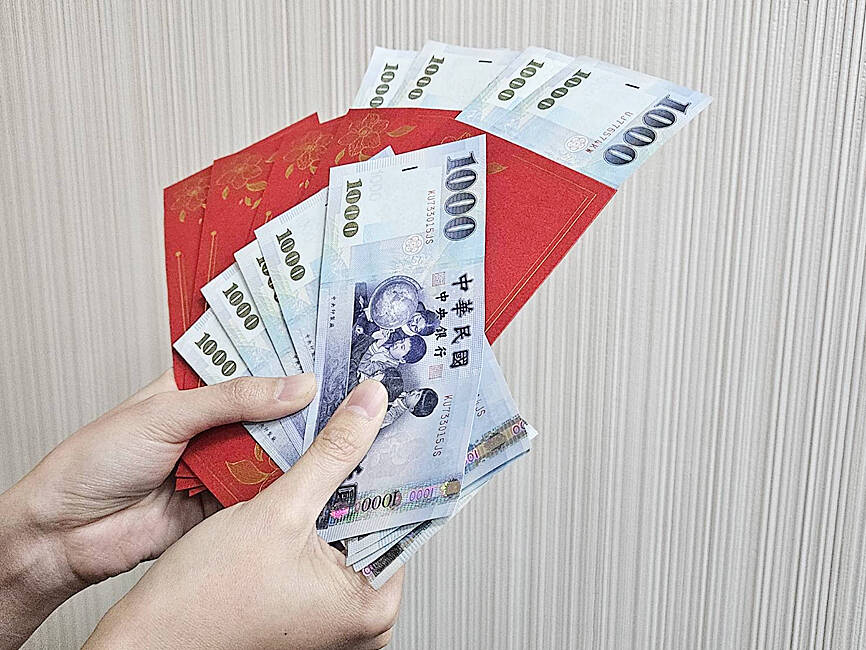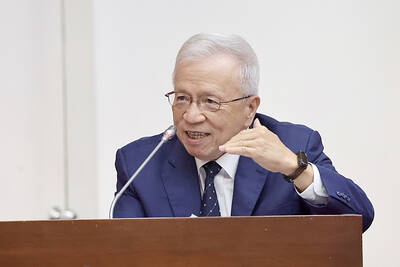As the end of the year approaches, 68 percent of Taiwanese companies are set to issue bonuses, with the average payout expected to slightly decrease to 1.56 months of salary, from 1.62 months last year, a survey released yesterday by 104 Job Bank (104人力銀行) showed.
Bonuses differ significantly across industries — highlighting a widening gap between higher-paying and lower-paying sectors, the survey showed.
Semiconductor companies are projected to offer the highest bonuses, averaging 1.98 months of salary. They are followed by construction firms with 1.73 months, warehousing and transportation support services at 1.67 months, architectural and design firms at 1.61 months, and electronic component manufacturers at 1.6 months.

Photo: CNA
These sectors benefit from higher profit margins or rely on specialized technical expertise, contributing to higher bonuses, 104 Job Bank said.
On the other hand, lower bonuses are expected in industries such as publishing and arts-related businesses (0.78 months), accommodation services (0.97 months), food and beverage providers (1.07 months), sports and leisure travel companies (1.14 months), and mass media (1.18 months).
These industries tend to be more labor-intensive or sensitive to consumer demand fluctuations, contributing to more conservative bonus policies, 104 Job Bank said.
For total annual compensation — including base salary, fixed bonuses and variable bonuses — the median salary is about NT$673,000 (US$21,559) this year, it said.
The technology and financial sectors remain among the highest-paying industries. Computer and consumer electronics manufacturing jobs top the list with a median total compensation of NT$897,000, followed by semiconductors at NT$848,000. Investment and wealth management, software and Internet-related jobs, and financial institutions each report a median compensation of NT$792,000.
The survey also highlights the highest-paying job categories. Among engineering positions, analogue IC design engineers lead with NT$1.71 million in annual compensation, followed by digital IC design engineers at NT$1.65 million, semiconductor engineers at NT$1.17 million, firmware engineers at NT$1.16 million and semiconductor process engineers at NT$1.08 million.
These roles typically require advanced technical expertise and cross-disciplinary skills, it said.
In non-engineering fields, physicians earn the highest annual compensation at NT$2.12 million, followed by channel development professionals at NT$1.57 million, investment managers at NT$1.2 million, university professors at NT$1.15 million and telemarketers at NT$1.09 million.
High pay in these categories is linked to professional qualifications, direct revenue contribution or performance-based reward mechanisms.
A polarized wage trend has become increasingly apparent this year, 104 Job Bank senior consultant Jessica Lo (羅悅華) said.
Lo said strong salary growth in the technology sector continues to attract talent toward high-paying industries, creating additional pressure on lower-paying sectors to secure skilled professionals.
Companies should complement competitive salaries with strengthened employer branding — through enhanced benefits and a positive corporate image — to attract and retain talented workers, she said.

JITTERS: Nexperia has a 20 percent market share for chips powering simpler features such as window controls, and changing supply chains could take years European carmakers are looking into ways to scratch components made with parts from China, spooked by deepening geopolitical spats playing out through chipmaker Nexperia BV and Beijing’s export controls on rare earths. To protect operations from trade ructions, several automakers are pushing major suppliers to find permanent alternatives to Chinese semiconductors, people familiar with the matter said. The industry is considering broader changes to its supply chain to adapt to shifting geopolitics, Europe’s main suppliers lobby CLEPA head Matthias Zink said. “We had some indications already — questions like: ‘How can you supply me without this dependency on China?’” Zink, who also

At least US$50 million for the freedom of an Emirati sheikh: That is the king’s ransom paid two weeks ago to militants linked to al-Qaeda who are pushing to topple the Malian government and impose Islamic law. Alongside a crippling fuel blockade, the Group for the Support of Islam and Muslims (JNIM) has made kidnapping wealthy foreigners for a ransom a pillar of its strategy of “economic jihad.” Its goal: Oust the junta, which has struggled to contain Mali’s decade-long insurgency since taking power following back-to-back coups in 2020 and 2021, by scaring away investors and paralyzing the west African country’s economy.

BUST FEARS: While a KMT legislator asked if an AI bubble could affect Taiwan, the DGBAS minister said the sector appears on track to continue growing The local property market has cooled down moderately following a series of credit control measures designed to contain speculation, the central bank said yesterday, while remaining tight-lipped about potential rule relaxations. Lawmakers in a meeting of the legislature’s Finance Committee voiced concerns to central bank officials that the credit control measures have adversely affected the government’s tax income and small and medium-sized property developers, with limited positive effects. Housing prices have been climbing since 2016, even when the central bank imposed its first set of control measures in 2020, Chinese Nationalist Party (KMT) Legislator Lo Ting-wei (羅廷瑋) said. “Since the second half of

AI BOOST: Next year, the cloud and networking product business is expected to remain a key revenue pillar for the company, Hon Hai chairman Young Liu said Manufacturing giant Hon Hai Precision Industry Co (鴻海精密) yesterday posted its best third-quarter profit in the company’s history, backed by strong demand for artificial intelligence (AI) servers. Net profit expanded 17 percent annually to NT$57.67 billion (US$1.86 billion) from NT$44.36 billion, the company said. On a quarterly basis, net profit soared 30 percent from NT$44.36 billion, it said. Hon Hai, which is Apple Inc’s primary iPhone assembler and makes servers powered by Nvidia Corp’s AI accelerators, said earnings per share expanded to NT$4.15 from NT$3.55 a year earlier and NT$3.19 in the second quarter. Gross margin improved to 6.35 percent,